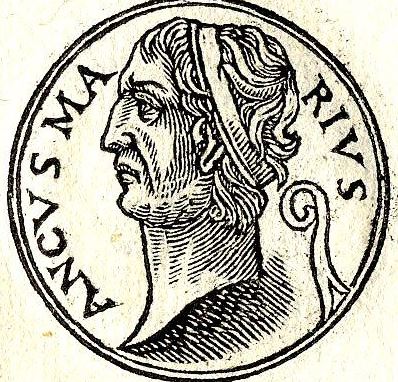Ancus Marcius was the fourth king of Rome, reigning from 642 BCE to 617 BCE. As a legendary figure in Roman history, Ancus Marcius is credited with consolidating Rome’s early power, balancing military prowess with diplomatic acumen. His reign is often seen as a pivotal moment in the development of Roman society, infrastructure, and territorial expansion.
This article explores the life, achievements, and legacy of Ancus Marcius, examining his role in shaping early Rome and how his reign set the foundation for the city’s later dominance.
Early Life and Background
Ancus Marcius is believed to have been the grandson of Numa Pompilius, the second king of Rome, who was known for his peaceful rule and religious reforms. As a descendant of Numa, Ancus was associated with the Sabine heritage, a people known for their influence on Roman religious and cultural practices.
His connection to Numa Pompilius likely influenced his reign, particularly in his emphasis on religious and legal institutions, alongside his efforts to secure peace through diplomacy. However, Ancus Marcius was also known for his military campaigns, balancing the legacy of his peaceful grandfather with the demands of defending and expanding Roman territory.
Ascension to the Throne
Ancus Marcius became king after the death of Tullus Hostilius, the third king of Rome, whose reign was marked by war and military aggression. Unlike Tullus, Ancus sought to restore the religious traditions that had been neglected under his predecessor. Upon his ascension in 642 BCE, Ancus immediately began efforts to renew the rituals and practices established by his grandfather, believing that Rome’s success depended on its adherence to the will of the gods.
Despite his focus on religion, Ancus was no stranger to warfare, and much of his reign was spent balancing the needs of military defense with the peace and prosperity of his growing city.
Religious and Legal Reforms
One of the most significant contributions of Ancus Marcius was his religious and legal reforms. He is said to have ordered the transcription of religious laws and rituals established by Numa Pompilius. By committing these laws to writing, Ancus ensured that the religious practices of Rome would be preserved for future generations and that the Romans would remain in the favor of the gods.
Ancus Marcius is also credited with establishing the role of the fetiales, a group of priests responsible for overseeing the proper declaration of war and the negotiation of treaties. The fetial law created under his reign outlined the formal procedures for diplomatic relations and warfare, ensuring that military actions were just and sanctioned by religious authority. This process of formalizing diplomacy and conflict resolution became an important part of Rome’s legal and military traditions.
Military Expansion and Territorial Growth
Although Ancus Marcius is often associated with religious reform, he was also a skilled military leader who expanded Roman territory significantly during his reign. He successfully waged war against several neighboring tribes, including the Latins, Fidenae, and the Veii. His military campaigns resulted in the expansion of Roman control over the surrounding region, especially along the Tiber River.
Founding of Ostia
One of Ancus Marcius’ most enduring accomplishments was the founding of Ostia, Rome’s first colony and seaport, located at the mouth of the Tiber River. Ostia became a vital hub for trade and military activity, allowing Rome to control access to the river and facilitating commerce with other Mediterranean cities. The establishment of Ostia marked an important step in Rome’s economic and strategic growth, as it provided a secure link between the city and the sea.
Military Fortifications
Ancus Marcius also fortified the Janiculum Hill, located across the Tiber from Rome. By securing this strategic high ground, he protected the city from external threats and ensured that Rome’s borders were well-defended. In addition to the fortifications, he constructed a bridge across the Tiber, the Pons Sublicius, which provided a crucial connection between Rome and its newly conquered territories on the opposite bank of the river.
Social and Cultural Contributions
Ancus Marcius’ reign was also marked by significant social and cultural development. As Rome expanded its territory, it began to absorb people from the regions it conquered, particularly the Latins. Ancus was known for his relatively inclusive policies toward these new subjects, granting many of them Roman citizenship and incorporating them into the growing city.
By offering citizenship to conquered peoples, Ancus Marcius helped to integrate diverse populations into Roman society, setting the stage for the multicultural and inclusive policies that would later define the Roman Empire.
Death and Succession
Ancus Marcius died in 617 BCE, after a reign of 25 years. He was succeeded by Lucius Tarquinius Priscus, a figure who would play a significant role in Rome’s future expansion and transformation. The peaceful transition of power to Tarquinius, who was not of Roman birth, demonstrated Ancus’ ability to ensure stability and continuity in governance.
Ancus Marcius was buried near the Pons Sublicius, the bridge he had constructed over the Tiber, symbolizing the enduring legacy of his contributions to Roman infrastructure and territorial expansion.
Legacy of Ancus Marcius
Ancus Marcius’ reign is often seen as a bridge between the religious, peaceful policies of his grandfather Numa Pompilius and the militaristic expansionism of kings like Tullus Hostilius and Tarquinius Priscus. His ability to balance these two aspects of kingship—religious duty and military power—helped shape Rome’s identity during its formative years.
His legacy includes:
- Religious and legal reforms that solidified the role of religion in Roman governance.
- Territorial expansion through successful military campaigns, extending Roman control over Latium and other neighboring regions.
- The founding of Ostia, which became a crucial port for trade and military logistics.
- The construction of infrastructure, including fortifications and bridges, that strengthened the city’s defenses and facilitated its growth.
Ancus Marcius is remembered as a capable and balanced ruler who laid the groundwork for Rome’s future success, both militarily and culturally. His reign marked a period of consolidation, religious revival, and territorial growth, helping to transform Rome from a small city-state into a powerful and influential kingdom.
Ancus Marcius, as the fourth king of Rome, played a crucial role in shaping the early history of the city. His reign combined the religious and cultural values of Numa Pompilius with the military ambition of his predecessors, resulting in a period of stability, expansion, and development. From his military victories to his founding of Ostia, Ancus Marcius left a lasting legacy that would influence Rome’s trajectory for centuries to come. His contributions to religion, law, and infrastructure are key elements of Rome’s transformation from a fledgling kingdom into a burgeoning power in the ancient world.




